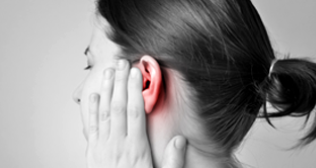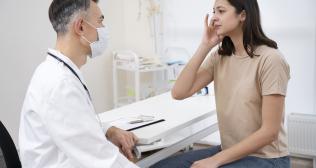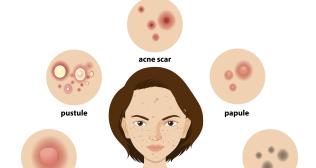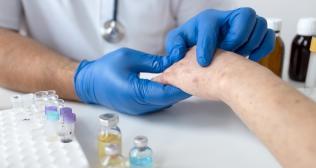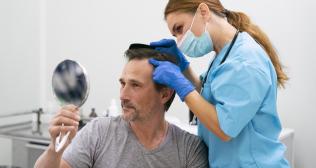
Hyperhidrosis: Types, Symptoms, Causes, and Treatment | Fortis Healthcare
What is hyperhidrosis?
Hyperhidrosis is a medical condition that causes an individual to sweat excessively which cannot always be attributed to heat or exercise. Although sweating assists in maintaining body temperature, this condition produces an unusual amount of sweat which causes social anxiety and embarrassment.
How does hyperhidrosis work inside your body?
Normally in situations such as a fever, heavy exercise, or a rise in air temperature, your sweat glands which are located in the armpit, eyelids, areola, and other body parts produce perspiration. This is transported to your skin’s surface where it evaporates from. After this process and when there are no appropriate situations where your body needs to sweat, the nerves which are responsible for producing sweat are halted. In people who suffer from hyperhidrosis, these sweat glands do not stop and continue to produce sweat even when the situations don’t call for it like in a swimming pool or sitting in an air-conditioned room.
Symptoms of hyperhidrosis
The main symptom of an individual having hyperhidrosis is excessive sweating. Even in environments that do not have situations that induce sweating such as an air-conditioned room, if a person sweats it could mean that they have hyperhidrosis. This type of sweating also affects all body parts including palms and hands and is responsible for at least an episode a week is the individual is awake at that time.
Different types of hyperhidrosis
There are two types of hyperhidrosis-
- Primary hyperhidrosis- This type causes the individual to sweat excessively on their hands, face, palms, underarms, and feet. Primary hyperhidrosis does not have an underlying medical condition or drive and it is possible for this to run in families. This is also called by names such as focal or essential hyperhidrosis.
- Secondary hyperhidrosis- This type causes the individual to sweat all over their body and is caused by an underlying medical condition like hormonal medications, antidepressants, or antidepressants. Excessive heat can also be responsible for this. This type of hyperhidrosis is also called generalized hyperhidrosis. This is also a more serious condition medically than primary hyperhidrosis.
What causes hyperhidrosis?
There are many conditions and factors which cause hyperhidrosis. There are different causes for different types of hyperhidrosis. For secondary hyperhidrosis, it is caused by-
- Medical conditions like
- Diabetes- This can cause nerve damage which leads the nerves causing sweat to be constantly switched on.
- Thyroid problems- Thyroid problems such as hyperthyroidism cause the thyroid gland to excrete an excess of hormones which leads to hormonal imbalance, and increases body metabolism thus further causing hyperhidrosis.
- Menopause hot flashes- Hormone levels fluctuate during menopause which causes the hypothalamus to not regulate your body’s heat properly which leads to excessive sweating.
- Some cancers- When your body tries to fight cancer and the excessive treatment it gets causes hormonal imbalance which leads to sweat getting produced at an abnormal rate.
- Infections- Infections lead to inflammation in the body which affects the nerves that control sweating leading to increased sweating in specific areas.
For primary hyperhidrosis, it is caused by
- Faulty nerve signals- These lead the sweat glands to behave in an overactive manner and trigger the eccrine sweat glands which leads to hyperhidrosis.
- Odors of citric acid, coffee, chocolate, peanut butter, or spices. - These odors stimulate the sympathetic nervous system that controls sweat. Due to these odors, the sweating becomes excessive.
- Anxiety or other emotional stresses.- Anxiety is also responsible for stimulating the sympathetic nervous system which overstimulates the sweat glands thus leading to primary hyperhidrosis.
- Excessive heat- When the body is exposed to higher temperatures, more sweat is secreted to balance body temperatures.
- Spinal cord injury.- A disrupted autonomic nervous system is responsible for hyperhidrosis as damage to the sympathetic nerves caused by spinal injuries leads to excessive sweating.
Is hyperhidrosis common?
Hyperhidrosis as a condition is quite rare only affecting around 1% of the population. However, since people who sweat excessively do not talk about their symptoms much and might not consider it to be serious, more and more people don’t speak out about it.
Diagnosing and Testing
This condition is characterized by excessive sweating which patients usually feel embarrassed about. Without talking to a healthcare provider, hyperhidrosis is difficult to diagnose. Your medical history and symptoms will be examined to provide an official diagnosis. The consistency of the symptoms also plays a role in diagnosis.
Further testing may also be required such as-
- Blood tests- Blood tests are used to examine substances in the blood and rule out or diagnose diseases. Cells, chemicals, or proteins in the blood are examined.
- Urine tests- These examine the chemical and physical properties of urine to rule out or diagnose diseases.
- Starch iodine tests- The iodine solution will be applied to sweaty areas and starch will be sprinkled over the iodine solution, and this solution will turn blue-black in excess sweating.
- Paper test- Your healthcare provider will place the special paper on the places you sweat from and weigh it later to see the amount of sweat produced.
Treatments used for hyperhidrosis
- Lifestyle changes and self-care habits- Usually in patients when they change their lifestyle such as wearing breathable fabrics or showering more, this condition improves. Healthcare providers may also suggest using antibacterial soap and thoroughly drying all areas associated with sweating.
- Aluminum-based antiperspirants- These antiperspirants seal up the sweat glands and prevent excessive secretion of sweat. The stronger these are the more they'll help but they could also cause some side effects.
- Oral medications- Oral medications such as antidepressants might be prescribed which lessens sweating while also having a calming effect. The aluminum-based antiperspirants work better with anticholinergic drugs such as glycopyrrolate and oxybutynin.
- Clinical wipes- Armpit sweating may be reduced by clinical wipes containing glycopyrronium tosylate.








